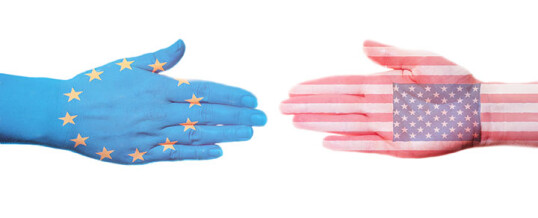
As an American exporter, I have pretty much given up on relying on President Barack Obama to carry through on his promises to spur American trade. He promised to double exports by 2015, but that promise is languishing.
In fact, the Economic Policy Institute notes that “while the U.S. trade deficit in petroleum goods declined $34.8 billion (10.7 percent), the U.S. trade deficit in non-petroleum goods increased $35.3 billion (8.8 percent). Growing goods trade deficits have eliminated millions of U.S. manufacturing jobs over the past decade, and non-petroleum goods were responsible for the vast majority of the jobs displaced. Rapidly growing trade deficits in non-petroleum goods, especially manufactured products, represent a substantial threat to the recovery of U.S. manufacturing employment.”
They have it exactly right. When exports grow, job growth follows. But the president and his administration just don’t seem to get it. But maybe they are finally waking up.
During the president’s latest State of the Union Address, he announced that the United States was pursuing a free-trade agreement with the European Union. I could hardly believe my ears. He actually admitted that “trade that is free and fair across the Atlantic supports millions of good-paying American jobs.”
So why did it take so long for him to realize that the best way to reduce the 25 million Americans that are unemployed or underemployed is to follow through on his pledge to double exports? And why is he only focused on the European Union? Why not “trade that is free and fair” with Japan, China, India, Brazil and Russia?
He pretended to play the game during his first term by announcing the ratification of the free-trade agreements with South Korea, Panama and Colombia. The truth, of course, is that these three trade agreements were initiated by another administration. He did not initiate a single free-trade agreement during his first term.
To give you a feel for how important free-trade agreements are to our economy, with the passing of the South Korea free-trade agreement, the expected result is U.S. exports to South Korea will grow by as much as $11 billion and support a minimum of 70,000 new U.S. jobs. The trade pact with Colombia will increase U.S. exports to that country, now $12 billion a year, by $1 billion annually. Panama’s imports from the United States exceed its exports to the United States by a ratio of 10 to one. Currently, the United States exports $4.9 billion in goods and services to Pan¬ama. This number will certainly grow.
Concluding a free-trade agreement with the European Union would be a big step in the right direction. The New York Times reports that “Trade experts agreed that several new factors had converged to make an agreement more likely. The economic stagnation on both sides of the Atlantic has heightened the awareness that a prod to growth is needed. In a Democratic administration, free-trade agreements are much easier to reach with higher-wage, unionized countries like those in Europe that do not spook trade unions. And the cross-pollination between American and European companies, as in the auto sector, also is expected to blunt opposition from labor groups.”
Now we know why “free and fair trade” is not for everyone. Despite having a seemingly metamorphic experience on trade, he can only do so with the blessing of the unions. As I have written before, the president has outsourced American trade policy to the union bosses, which means 7 percent of America’s work force (those who are unionized) are holding hostage 93 percent of America’s work force (those who are not unionized).
In his State of the Union Speech, Obama referred to the proposed free-trade agreement as the Transatlantic Trade and Investment Partnership, but like every trade idea that this administration takes credit for, this idea actually started under a previous administration. The Transatlantic Free Trade Area (TAFTA) is something started by the Clinton adminstration.
The Christian Science Monitor suggested that the transatlantic economic relationship is still by far “the most important relationship in the world, accounting for about half of the world’s gross domestic product and almost a third of global trade flows. The U.S. and Europe remain each other’s most important markets. By some estimates, an agreement eliminating tariffs and other barriers between us could increase annual economic growth by up to 1 percent on both sides of the Atlantic.”
But this is no slam dunk. There are several wrinkles that need to be ironed out. This includes the fact that the European Parliament rejected the Anti-Counterfeiting Trade Agreement (ACTA), which was designed to better protect intellectual property around the world. ACTA has been strongly supported by the United States, and there’s a reason. The U.S. Trade Representative estimated that the U.S. economy lost between $200 billion and $250 billion in 2005 due to piracy, and that the U.S. economy loses more than 375,000 jobs annually due to piracy. In addition, U.S. workers lose $16.3 billion in earnings annually as a result of copyright piracy.
Although the president relegated just one sentence to the Transatlantic Trade and Investment Partnership in his State of the Union address, it may be the most important sentence he’s ever uttered. I only hope that this is more than a line thrown into a speech; I hope it’s a promise that he will keep. Millions of Americans are counting on it.
FEB



